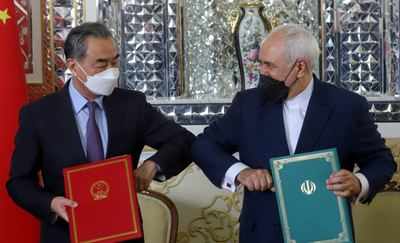[ad_1]

Iran’s Foreign Minister Mohammad Javad Zarif and China’s Foreign Minister Wang Yi bump elbows during the signing ceremony of a 25-year cooperation agreement, in Tehran (Reuters)
China agreed to invest $400 billion in Iran over 25 years in exchange for a steady supply of oil to fuel its growing economy under a sweeping economic and security agreement signed on Saturday. The deal could deepen China’s influence in the West Asia and undercut US’ efforts to keep Iran isolated. But it was not immediately clear how much of the deal can be implemented while the international dispute over Iran’s nuclear programme remains unresolved.
President Joe Biden has offered to resume negotiations with Iran over the 2015 nuclear deal that President Trump abrogated three years after it was signed. But he says Iran must first commit to adhering to the terms of the deal. Iran has refused to do so, and China has backed it up.
The foreign ministers of the two countries, Javad Zarif and Wang Yi, signed the agreement during a ceremony at the foreign ministry in Tehran on Saturday, according to Iran’s semiofficial Fars News Agency. The deal marked the first time Iran has signed such a lengthy agreement with a major world power. In 2001, Iran and Russia singed a 10-year cooperation agreement, mainly in the nuclear field, that was lengthened to 20 years through two five-year extensions.
Before the ceremony, Wang met Iranian President Hassan Rouhani. Iran’s foreign spokesman Saeed Khatibzadeh called the deal “deep, multi-layer and full-fledged”.
Iran did not make the details of the agreement public before the signing. But experts said it was largely unchanged from an 18-page draft obtained last year by NYT. That draft detailed $400 billion of Chinese investments to be made in dozens of fields, including banking, telecom, ports, railways, health and information technology, over the next 25 years. In exchange, China would receive a regular – and, according to an Iranian official, heavily discounted – supply of Iran oil. The draft also called for deepening military cooperation, including joint training and exercises, joint research and weapons development and intel-sharing.
(Agencies)
FacebookTwitterLinkedinEMail
[ad_2]
Source link